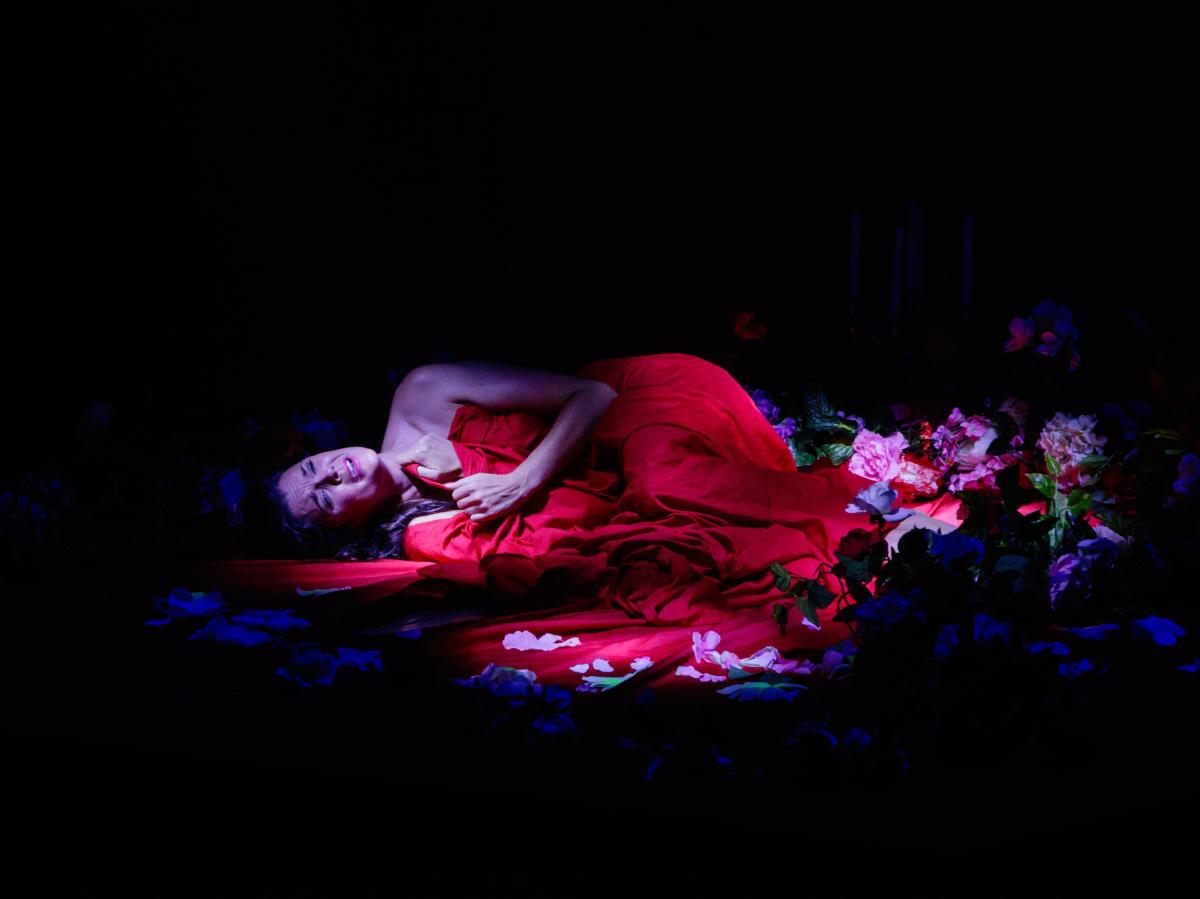Valda Wilson as Theodora. Photograph by Robert Catto.
Handel loved his Theodora, rating it far above his other Oratorios. However, it was not popular in his day, but since the very late Twentieth Century with the landmark production at Glynbourne in 1996, Theodora has gradually found its rightful place among his Baroque masterpieces.
Yet again, here under the magnificent direction of Lindy Hume, Pinchgut thrills and delights us with this glorious production. Musically and vocally it was ravishing, the Orchestra of the Antipodes under the bouncy, enthusiastic yet extremely precise direction of Erin Helyard were lush, dynamic and lyrical – soaring yet well controlled – look out for the contra bassoon especially required for this opera. Tempos were elastic and flexible, the strings rich velvety and detailed. A delicate haunting flute is featured in Theodora’s prison scene, contrasted with braying horns for the Romans especially in the opening feast after interval and scurrying violins in arias such as ‘Sweet Rose and Lily’.
The plot is simple and set in ancient times but still resonates today. Christians are being persecuted in China and the Middle East but it could also be representative of any sect that disagrees with the ruling powers and protests: ‘us’ vs ‘them’. Valens, autocratic Roman ruler of fourth-century Antioch, demands everyone sacrifice to Jupiter for the Emperor’s birthday celebrations. When the Christians decline, Theodora, a prominent member and a virtuous noblewoman, is arrested and threatened with being forced into ritual prostitution – for her, a fate worse than death. Didymus, a Roman soldier and secret Christian convert, chastely in love with Theodora, exchanges clothes and places with her, so she can escape, but when he is condemned in her place Theodora returns and ‘they blissfully enter immortality together’ in a double martyrdom.
Under Hume’s direction the staging was rather sparse and simple, with minimal sets and effects. The raised platform stage with steps took up most of the space.There was a tilted screen used for the surtitles and some of Matthew Marshalls’ very atmospheric, glowing lighting and special effects such as clouds (or angels wings?) for one of Theodora’s solos. There was also a heavy tilted square lighting rig up high, with grey plastic clouds (brewing storm clouds?) The Romans were identified by a gloved hand and mottled painting on the sleeve of one arm. The Christians were plain clothed – so the chorus could easily change from ‘saints‘ to ‘sinners‘ by changing or removing the coats.
International star Aussie Valda Wilson dazzles and captivates as Theodora. Noble,virtuous and strong she is also vulnerable underneath, yet her faith will conquer all. Her first solo ‘Though Hard‘ is inspirational and her troubled solo when in prison ‘O Thou Bright Sun’ was a soaring prayer. She sings with a radiant freshness.The duets between her and Didymus when they are falling in love were lush and exquisite. Our hero, counter tenor Didymus was magnificently sung by international star Christopher Lowrey (last seen in Sydney in Pinchgut’s Bajazet). from his first rousing solo ‘The Raptured Soul’ he had us spellbound with his warm voice. His flourishes and stylish ornamentation were galvanised at times with great agility without renouncing his lyrical smoothness. Tall, dark and handsome Septimius, Didymus’ friend, was splendidly sung by Ed Lyon, dashing in his military uniform. He does his ‘duty’ as commanded by Valens but with great reluctance (‘Descend Kind Pity‘ was magnificently sung). He has a versatile range with delicious upper timbres for his bright tenor and an agile, sinewy tone. He is torn between his duty and compassion and his friendship with Didymus. He secretly helps Didymus exchange places with Theodora and is left alone and devastated crouched and grieving. Irene, the female leader of the Christians in Antioch was beautifully sung by Caitlin Hulcup. She was calm and strong, her solos ‘The Clouds Began to Veil’ and ‘Defend Her and Lord To Thee Each Night and Day’ were sensational. She sang with limpid mellifluousness and was firm and inspired. Valens the tyrannical Roman governor was portrayed by Andrew Collis as menacing and perhaps slightly mad, turning ‘Racks, Gibbets, Swords‘ into an astonishing, furious aria.
A minimalist rather restrained staging of the sweeping musical drama. Theodora is musically and vocally tremendous and the 18th century sound is lush and detailed. Go on – treat yourself.
Rating: 4 stars out of 5
Handel’s Theodora
BY GEORGE FREDERICK HANDEL
Valda Wilson
Caitlin Hulcup
Christopher Lowrey
Ed Lyon
Andrew Collis
Cantillation
Orchestra of the Antipodes
Erin Helyard, conductor
Lindy Hume, director
Dan Potra, designer
Matthew Marshall, lighting designer
Sally Blackwood, assistant director
Keiren Brandt-Sawdy, assistant conductor
Pinchut Opera
City Recital Hall
30 November – 6 December 2016





